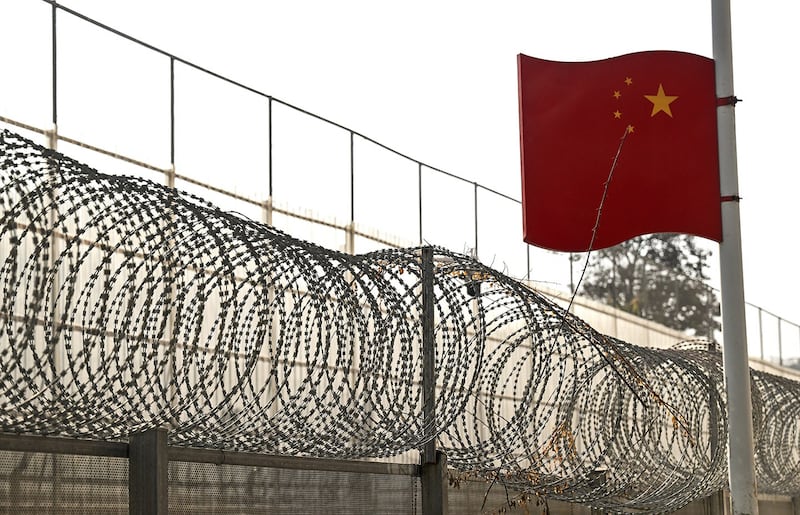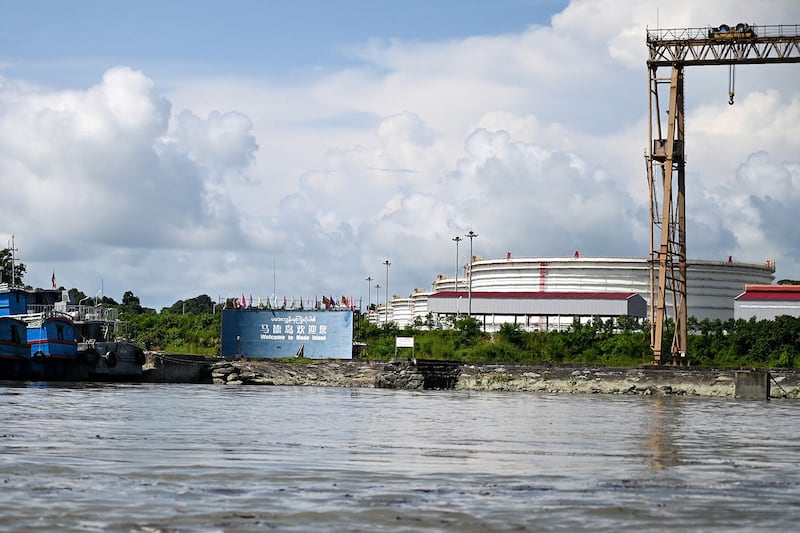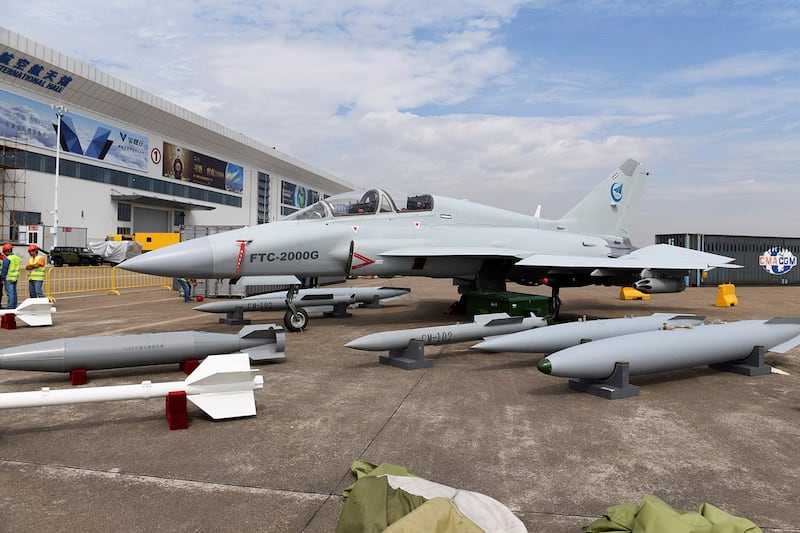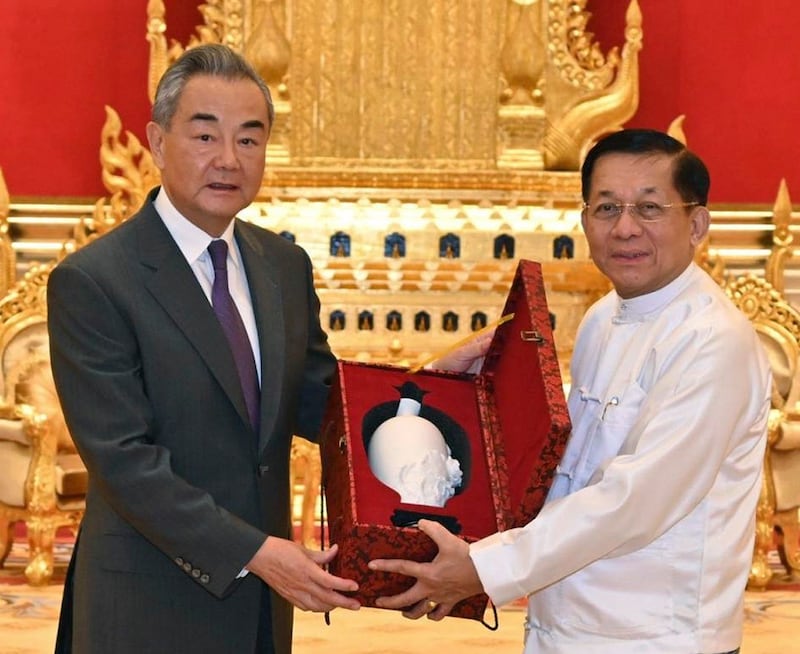China borders 14 countries, tied with Russia for the most in the world, and Beijing takes great pains to ensure the security of its interests and defend against conflicts from spilling over. Despite that, China’s Myanmar policy is based on faulty assumptions and is undermining its own interests.
China’s policy since the February 2021 coup – which Beijing simply labeled a change in government – has never been good. Nonetheless, it refrained from offering initial support for the State Administrative Council (SAC), as the junta formally calls itself, and put pressure on them not to ban the National League for Democracy, which they ultimately did in March 2023.
For the first two years, Beijing clearly hedged their bets. But since then, the Chinese have doubled down on the junta.
China continues to sell weapons, and there is evidence that Chinese technicians are working in Myanmar's defense industries. There is clearly some technology sharing. A new shell designed for drone warfare is a copy of a Chinese-produced munition.

At the same time, China had initially held the junta at arms length diplomatically. They have never invited Min Aung Hlaing to China, including to the poorly attended third Belt and Road Initiative summit in October 2023. While China invited the junta’s deputy commander, Soe Win, in July 2024, it was only in a multilateral setting.
China has both supported ASEAN's decision to keep Myanmar's representation at the non-political level, but also the Thai-led Track 1.5 initiative to engage the junta.
China's primary concern has been the protection of its economic interests, in particular their parallel oil and gas pipelines in Myanmar and the Wanbao copper mine. Another priority for China was the development of their special economic zone in the Rakhine state port of Kyaukphyu.
Beijing has long been frustrated with the slow implementation of the project, which includes rail and road links to the Chinese border. Although they were able to negotiate further concessions from the diplomatically isolated junta, the project continues to stall.
Rebels control borders, resources
But since the Three Brotherhood Alliance, a trio of ethnic armies that have received various degrees of support from China over the years, launched an offensive against the military regime called Operation 1027 a year ago, there’s been a hardening of China’s position, in line with the junta’s losses.
The Three Brotherhood Alliance, which includes the Ta’ang National Liberation Army, Arakan Army, and Myanmar National Democratic Alliance Army (MNDAA), as well as the Kachin Independence Army (KIA), now controls all but one of the major border crossings to China.
There has been some $9 billion in cross border trade since the 2021 coup. While this is not huge in terms of China’s overall trade, it matters to Yunnan province, especially in the context of slowing economic growth. And for the sanctioned junta with dire shortages of foreign exchange, border trade is a financial lifeline.
China recently shut down five border gates, in order to punish the opposition which continues their offensive against the military. The government in Yunnan has cut electricity and internet service in the enclave of Kokang to further pressure the MNDAA.

But facts on the ground are changing. China now must contend with the reality that 90% of Myanmar’s natural resources, including jade and rare earth minerals, are now either controlled by opposition forces or are in contested areas.
Chinese hydroelectric dams are now under the control of non-state actors in Shan state, while the KIA is moving in on Chinese backed dams in Kachin.
Other Chinese investments are now in opposition-controlled territories, and they must now pay taxes to the shadow National Unity Government (NUG) or to ethnic resistance organizations.
While the Arakan Army (AA) has not taken Kyaukphyu, it controls all the surrounding territory in Rakhine state. Any development of the special economic zone requires negotiations with them. The capture of Ann Township would give the AA control over a pipeline pumping station.
AA control of the territory surrounding the port city of Sittwe forced the Indian government to reevaluate their Myanmar policy and engage the Arakan Army and NUG. China is digging in their heels.
Signs of Chinese frustration
Since Operation 1027 began last October 27, China has continued the transfer of weaponry to the junta. In August, the military took possession of six additional FTC-2000G jet trainers, produced by Guizhou Aviation Industries, a division of the large military conglomerate AVIC.
While air power alone can punish civilians, it cannot hold territory, a task that is increasingly beyond the reach of the junta military. Despite at least six intakes of conscripts, adding an estimated 30,000 troops, the new forces are hastily trained, inadequately equipped, and poorly motivated.
Some 300 junta troops surrendered in northwestern Sagaing region early this month after nearly one month of fighting. The military was simply unable to resupply them and other forces deployed to far-flung outposts around the country.
Peoples' Defense Force militias and ethnic armies are now routinely targeting the army's riverine transportation. Demoralized soldiers are voting with their feet and surrendering.

The military l aunched a counter-offensive to retake territory lost since Operation 1027 began. While they have made limited inroads, they've been against priority urban targets, such as Laukkaing in Shan State's Kokang region.
A leaked document from a July meeting between China's special envoy for Myanmar, Deng Xijun, and the powerful United Wa State Army rebel group, laid bare Beijing’s frustration that the Three Brotherhood Alliance refuses to stop its offensive. China’s concerns about the potential fall of the junta are palpable.
China has since also pressured the MNDAA to distance itself from the tripartite alliance and publicly state that it would not coordinate actions with the NUG.
Chinese Foreign Minister Wang Yi traveled to Naypyitaw to pledge additional financial assistance to the junta, prompting the NUG to issue a stern warning that debts incurred by an illegal government will not be honored by a future democratic government.
RELATED STORIES
China’s frustration with the Myanmar junta’s incompetence is mounting
As Myanmar junta falters, rival ethnic armies jostle in Shan state
[ Caveat creditor: China offers a financial lifeline to Myanmar’s juntaOpens in new window ]
[ No limits to the lawlessness of Myanmar's predatory military regimeOpens in new window ]
Willfully ignorant
It is for this reason alone that China has been calling for elections. Beijing sees these both as an offramp and as a way for the military to maintain its political influence in a post-conflict government.
Deng and Beijing’s new ambassador to Myanmar, Ma Jia, appear to be willfully ignorant about the degree to which the people of Myanmar hold China in contempt for propping up the military, giving them the weaponry to intensify their aerial attacks on civilian populations, and for searching for ways for the military to prolong their disastrous political interference.
China is clearly on the wrong side of history. Chinese diplomats and intelligence analysts are not stupid people. So why are they getting this one so wrong?
In part, it’s because of their ideology and analytical blinders. As an authoritarian regime, China can’t imagine a fellow authoritarian regime failing, especially one that they back.
But it’s also wishful thinking driven by fear. China, as a statist regime, is highly uncomfortable with the idea of a messy federal democracy on its borders.

So for now Beijing is backing the junta, which, despite every advantage in resources and military capabilities, has fallen under the weight of its own incompetence, avarice and delusional thinking.
Beijing believes that a corrupt and pliable Myanmar government that includes the military will best serve Chinese interests. At the same time, the NUG and their allies will never accept elections or a negotiated settlement with the junta, who have proven themselves to be untrustworthy.
Giving the junta a seat at the table gives them yet another opportunity to kick the forces of democracy and federalism in the teeth. The people of Myanmar have fought too hard and suffered too much to accept that.
Zachary Abuza is a professor at the National War College in Washington and an adjunct at Georgetown University. The views expressed here are his own and do not reflect the position of the U.S. Department of Defense, the National War College, Georgetown University or Radio Free Asia.
